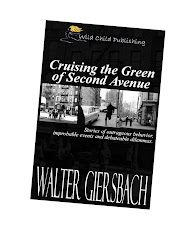I knew I was no longer home when
I moved to New Jersey and asked a clerk to give me a sack for my purchase. “Sack?”she almost shouted. “D’ja mean bag? Wherja come from?”
Jersey has an identity problem, lying
between Phil’delphia and N’yawk, both in its distinctive accent and the words
we choose. It starts with the little
things, like telling someone “I’m going down the shore.” Never the beach. Or looking curiously at the bennies (from
Brooklyn, Elizabeth, Newark and New York). Or believing jug handles are part of the
natural order of road intersections.
There’s a bit of both Philly and
the City in the way we talk. Oops, I
meant to say tawk when you ask for a cuppa cawfee at a diner. Linguist Ann Şen (pronounced Shen) at the
University of Rochester suggests the “aw” sound for “o” is a carryover from the Revolutionary
War when Tories wanted to sounded more Brit.
So we have the towns of Fai-uh
Lawn and Fawt Lee on Route Faw.
You can see distinctions between
north and south Jersey accents divided somewhere along the line that separates
the 201/908 and 609 area codes. We’re in 732 country. But you won’t hear anyone call the state Joisey.
That’s an invention, says Rutgers linguist Fay Yeager. Our state may be a punch line in the Midwest,
but we’d drop the r and say Juh-sey. If someone makes that joke, you tell him or
her, “Pah-don me, but you ahn’t pr’nouncin’ it right.” She says our talk is distinctive because we
drop the th diphthong and the r sound.
Curiously, we began dropping the r’s back in the 1920 to sound more
upper class, like the British — saying finga
instead of finger.
There also were waves of
immigrants who brought their own pronunciations. Go to a market and ask for half a pound of
capicola and the deli clerk will repeat gabacoal. Your mozzarella becomes mutzadell, ricotta ree-goat,
prosciutto pruh-zoot. It’s a carry-over of southern Italian
reinforced by TV episodes of the Sopranos
and Jersey Shore. My German-American Dad once asked a cop for
directions to the “Gettals Bridge.” The
officer gaped and said, “You mean Gothals.”
The th sound is unusual in many
languages, so it disappears or becomes a d sound, as in “We been tru dis tree
times already.” Fuhgeddaboudit! The German-Pennsylvania Dutch influence in
northwest Jersey does use the th sound as it was intended.
Linguists are even trying to
pinpoint county word choices, noting that Monmouth and northern Ocean say
downspout (the pipe carrying “war-der”— water— off the roof), sprinkles instead
of jimmies, and sub instead of hoagie or hero.
You might also identify a firefly and not a lightning bug if you’re in
south Jersey. In Atlantic County, you
won’t hear about the bennies as much as you will the shubies — those tourists
coming in on the A.C. Expressway with picnics in a “shoe box.”
TV and our mobile population are
wiping out these small, but beautiful, differences in accent and language. Marketers have us calling the Era laundry
detergent Air-a and not Eer-a, while the McDonalds folks in
their Illinois headquarters advertise breakfast hotcakes — not pancakes.
Pretty soon, tawking Joisey will
be a thing of the past.




No comments:
Post a Comment